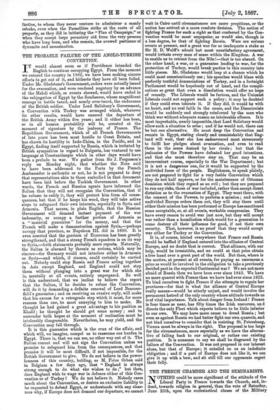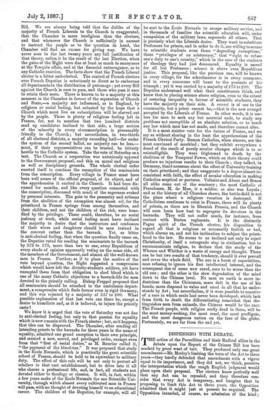THE FRENCH CHAMBER AND THE SEMINARISTS.
NOTHINOTHING could be more significant of the attitude of the NG Party in France towards the Church, and, in- deed, towards religion in general, than the vote of Saturday, June 25th, upon the ecclesiastical clause of the Military
Bill. We are always being told that the dislike of the majority of French Liberals to the Church is exaggerated, that the Chamber is more irreligious than the electors, and that whenever the Church is sufficiently in earnest to instruct the people as to the question in hand, the Chamber will find an excuse for giving way. We have never seen in the last twenty years any full justification of that theory, unless it be the result of the last Election, when the gains of the Right were due at least as much to annoyance at the Tonquin affair, and at the financial extravagance, as to any Catholic reaction. The facts show that the French Liberal elector is a bitter anti-clerical. The control of French electors over French Deputies is notoriously so direct as to embarrass all departments in the distribution of patronage ; yet every Bill against the Church is sure to pass, and those who pass it sure to retain their seats. There is known to be a majority at this moment in the Chamber in favour of the separation of Church and State,—a majority not influenced, as in England, by religious or social feeling, but actuated by the hope that a Church which must live on subscriptions will be starved out by the people. There is plenty of religious feeling left in France, for, not to mention that two hundred districts send up candidates inclined to that side, a large section of the minority in every circumscription is presumably friendly to the Church ; but nevertheless, in two-thirds of all electoral districts, a majority exceeding half—for under the system of the second ballot, no majority can be less,— must, if their representatives can be trusted, be bitterly hostile to the Catholic system. Take the vote of Saturday as a test. The Church as a corporation was notoriously opposed to the Government proposal, and this on moral and religious as well as disciplinary grounds. The whole clerical order exerted itself to continue the exemption of the seminarists from the conscription. Every village in France must have been well aware of the official proposal, of its object, and of the apprehension it excited in the Church. It had been dis- cussed for months, and like every question connected with the conscription, discussed with much of the eagerness evoked by personal interests. The gain to the peasantry and artisans from the abolition of the exemption was almost nil, for the priesthood in France springs from among themselves, and their children, and not the children of the rich, were bene- fited by the privilege. There could, therefore, be no social jealousy at work, while social feeling must have inclined the majority to desire that the instructors and confessors of their wives and daughters should be men trained in the convent rather than the barrack. Yet, so bitter is anti-clerical feeling, that when the question finally came on, the Deputies voted for sending the seminarists to the barrack by 373 to 173, more than two to one, every Republican of every shade of opinion apparently voting on the same side, all the members of the Government, and almost all the well-known men in France. Further, as if to place the motive of the vote beyond question, the Right suggested a compromise which would have left the divinity-students soldiers, yet have exempted them from that obligation to shed blood which is one of the many Catholic objections to a barrack-life for men devoted to the priestly calling. Bishop Freppel proposed that all seminarists should be attached to the ambulance depart- ment, a compromise which finds favour even in rigid Germany, and this was rejected by a majority of 347 to 200. What possible explanation of that last vote can there be, except a desire to humiliate and, as it is believed, to injure the priestly caste We know it is urged that the vote of Saturday was not due to anti-clerical feeling, but only to that passion for equality which is now a mania with the French elector; but, as it happens, that idea can be disproved. The Chamber, after sending all intending priests to the barracks for three years in the name of equality, admitted one grand exception to their own principle, and created a new, sacred, and privileged order, exempt even from that "first of social duties," as M. Bouvier called it, "the payment of the blood-tax." It was proposed that study in the Bcole Normale, which is practically the great scientific school of France, should be held to be equivalent to military duty. The effect of this rule will be not only to protect all scholars in that vast establishment, but to drive into it all who choose a professional life, and, in fact, all students not devoted either to theology or classics. It will, in fact, within a few years make of the Boole Normale the one Scientific Uni- versity, through which almost every cultivated man in France will pass, with no thought of devoting himself to an educational career. The children of the Deputies, for example, will all be sent to the Boole Normale to escape military service, and in thousands of families the scientific education will, under compulsion of the military laws, supersede all others. That is precisely what the Liberals desire. They want to substitute Professors for priests, and in order to do it, are willing to secure to scientific students even those "degrading exemptions," those " privileges of an aristocracy," that "right to refuse one's duty to one's country," which in the case of the students of theology they had just denounced. Equality is sacred for all but Professors ; science is above even Republican justice. This proposal, like the previous one, will be known in every village, for the schoolmaster is in every commune, and in every commune will boast to the peasants of his triumph ; yet it was carried by a majority of 273 to 240. The Deputies understand well what their constituents think, and know that in placing science above religion, even to the extent of restoring inequality in favour of scientific students, they have the majority on their side. A savant is of use to the community, but a priest cannot be,—that is the new evangel accepted by the Liberals of France. In other words, it is use- less for man to seek any but material ends, to study any problems not susceptible of an absolute solution, or to teach any law which man has not made, and therefore cannot alter.
It is a most sinister vote for the future of France, and we say so without sharing in the least the apprehensions of the French Clerical Party. Roman Catholics, when sincere, are the moat convinced of mankind ; but they exhibit everywhere a dread of the result of purely secular changes which is to us unintelligible. They were frightened to death by the abolition of the Temporal Power, which on their theory could produce no injurious results to their Church ; they talked, in Germany, timid nonsense about the effect of University training on their priesthood; and they exaggerate to a degree almost in- consistent with faith, the effect of secular education in making Catholics sceptical or perverse. Voltaire and About and Renan all alike came out of the seminary ; the most Catholic of Frenchmen, M. de Man, is a soldier, as also was Loyola ; and as the history of all Churches shows, the battle-field is not the place where a religious vocation is destroyed. If Catholicism continues to exist in France, there will be plenty of priests, as there are in Rhenish Prussia, and the Church will soon learn how best to segregate its devotees in the barracks. They will not suffer much, for instance, from contact with Breton regiments. It is the distinctly Pagan spirit of the French elector, his disposition to regard all that is religious as necessarily foolish or bad, which alarms us, and not his inclination to subject the priest- hood to the law. He seems to us inclined not only to reject Christianity, of itself a retrograde step in civilisation, but to excommunicate religion, to declare that the study of the Whence and Whither is a waste of energy and thought. There can be but two results of that tendency, should it ever prevail and cover the whole field. The one is a burst of superstition, man refusing to ignore his first intellectual interest, and the consequent rise of some new creed, sure to be worse than the old one ; and the other is the slow degradation of the mind down to the Chinese level. No man on earth is more in- dustrious than the Chinaman, more deft in the use of his hands, more disposed to value and excel in all that he under- stands by Art ; but nevertheless, if it were possible to conceive of a race in which souls had never been developed, which lack from birth to death the differentiating somewhat that dis- tinguishes men from animals, the Chinese would be the race. The French people, with religion really dead in them, will be the most money-seeking, the most cruel, the most profligate, and the most dangerous nation on the face of the globe. Fortunately, we are far from the end yet.



































 Previous page
Previous page